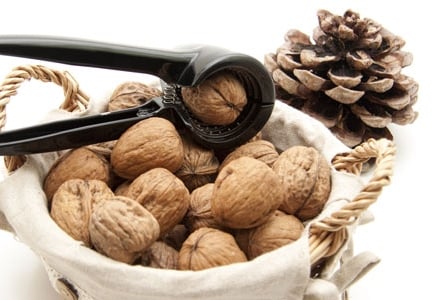
Walnut trees may be lost because of climate change. Scientists worry that our source of nutritious walnuts may be endangered by extreme weather changes.
The nutcracker, perched on a bowl of nuts, including delicious walnuts, is a Christmas tradition. But our Christmas nutcrackers may have less to do in coming years if scientists at Purdue University are correct. They theorize that, with continued climate change, walnut trees may not survive.
Douglass Jacobs, a professor of forestry and natural resources says that “the walnut is restricted to sites not too wet or dry. It has an extremely narrow range. We suspect and predict that climate change is going to have a real impact on walnuts.”
He adds that almost all climate change models predict that the climate will become drier, a problem for walnut trees that have difficulty tolerating droughts.
Walnut trees would also be affected by extreme temperature spikes, such as late spring frosts. Extreme weather conditions are a feature we can expect from climate change. The walnut has adapted to current cold conditions by sprouting leaves well after most other trees in the spring to avoid late frosts. But an extreme drop in temperature after leaves have developed would kill trees.
The hope of these scientists is that the seeds being produced now by mature walnut trees may adapt through genetic changes. In case they’re not doing this on their own through natural selection, scientists are doing their own selective breeding to come up with some walnuts that can withstand the heat and cold stresses that could be coming with the changing climate.
Of course, we know that walnuts aren’t just for cracking a tasty holiday snack. Because they’re packed full of heart-healthy nutrients, they’re perfect for eating anytime.
Some of our favourite ways to enjoy walnuts
Maple Squash Soup with Maple Walnuts
Chicken and Pear Bake with Walnuts and Crumbled Blue Cheese
Caramelized Fennel and Onions with Brussels Sprouts and Toasted Walnuts
Chocolate Apricot Walnut Cookies



